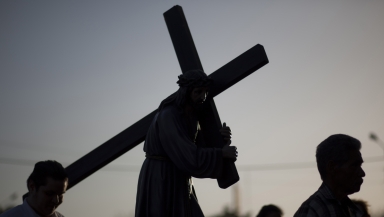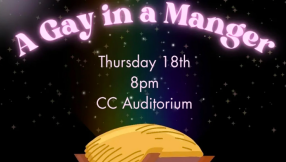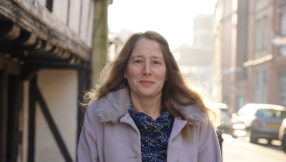
The school Easter holidays are now in full swing; it seems strange this year that Easter Sunday is right at the end of the holiday as it creates quite a build up – the kids were excited about Easter well before school broke up!
Writing for a range of 'dated publications' such as Bible study guides means that I actually spend time reflecting on Easter for months before it is upon us. I have a set of notes out for Easter but probably finished writing them well over six months ago. Such long lead times can mean you feel out of kilter with the calendar at times.
But I can also find that social media can be awash with too much information about a certain event in the Church calendar. That, coupled with our general over-busyness, could mean that, while we see all the articles and postings about Easter, it leaves us somewhat untouched and unchanged.
What a shame, because this truly is the pivotal part of our story as believers. Without Jesus' resolute determination to see His destiny completed we wouldn't be able to enjoy the grace-filled relationship with God we have as Christians. I know you know that – but I also know how easy it is to say it and not be affected by it.
Yet what an opportunity we have at this time of year to express something of the power of the resurrection to those around us. I've been challenged recently as I've thought about the ease and excitement with which our children talk about their faith.
They are so matter-of-fact about things at the moment, and I think that is down to their age (5 and 8). Indeed during the last school holiday I overheard our 5-year-old in a conversation with an older friend. It started because that boy used the name of Jesus as an expletive. Both our kids immediately said that in our home we don't use His name like that.
When the older boy said that He was just a guy who died wasn't He, our 5 year old explained that Jesus didn't just die but rose again. I have to say, after a quick check with the mum of the older child that she was okay with the exchange that had just happened, my heart welled up for my little boy. It was the first time I'd publicly heard him speak up about what he (we) believes and own it for himself. Moments like that are precious.
However, I wasn't quite so sure when, last week on the school trip I accompanied his class on, my son's best friend turned to him and said, 'Everyone sees God when they die.' My son immediately quipped back, 'No they don't. Only if they are Christians – isn't that right mummy?' To which his friend said, 'Well that's what my daddy said is true.'
I shifted uncomfortably on my coach seat and said a quick prayer asking for the wisdom to know how to handle this one! My son's friend's family is from Sri Lankan origins, although he was born in the UK. We don't know them that well so I have no idea if they hold to a particular religion or not. So I certainly didn't want to say something that could result in him or his parents being upset with us.
I quietly said to them both that everyone will find out when they die if what they have believed is true or not so. After a further short discussion, in which I asked if the boy's family visited a temple or mosque at the weekends, they went back to their usual conversation – Lego Star Wars.
This incident caused me to reflect on how open kids can be about issues of faith – and how important it is for us to teach them how to be generous when they share what they believe too.
My 8-year-old daughter is, at the moment, a natural evangelist. With that great child's air of innocence she is eager to share what she's done each week and, with her dad as a pastor, church is a huge part of our lives so she often talks about it. She's really pleased that her best friend goes to church – as a Catholic she's in the process of getting ready for her first communion. That's opened up some interesting conversations too (I'm really glad that it is usually her dad that gets the deep theological questions!).
There are times when I feel like my daughter's openness puts me to shame. She often comes home to share how she's talked to her friends about Jesus – how she's invited them to church and even how they've discussed how to pray during break times. It's so much a fact of her life that it simply oozes out of her. She hasn't got to the awkward stage of not wanting to offend. Which is great, because it means she's natural and totally open, but it has got us into a sticky situation or two!
I remember, a few years ago, being at another of her friend's houses and said friend suddenly bursting into tears. My daughter had been talking about the fact that you only go to heaven if you believe in Jesus and the girl said her daddy didn't at all. My daughter pointed out that, therefore, he wouldn't be allowed to go to heaven.
Her statement was a very logical conclusion for her, but her friend was left devastated and the mum rather angry. I had to do a quick 'mopping up', explaining to my daughter that we have to be gentle and careful with our words and that she needed to say sorry for upsetting her friend. And then I apologised to the mum myself (and was told that they would appreciate it if we didn't ram our beliefs down people's throats). The rest of that visit was pretty awkward!
I know the Gospel can be offensive – and Easter is a time when most people are looking forward to a family gathering and eating lots of chocolate. So hearing that it is actually a time when we reflect on the fact that our Saviour paid the ultimate sacrifice for us all, and then overcame the powers of darkness to rise again, will probably seem like an unnecessary and alien message. But one that it is so important for us to share.
We will be on our town's high street with a puppet show this weekend, also giving out Easter eggs and invites to our Easter service and generally chatting to people. I know most of us are out of our comfort zones when we do such an event (although the puppets do make it a lot easier, as they draw a crowd and are extremely popular even though the words of the songs are overtly Christian!) While our children need to learn grace and gentleness in their witness, we could learn a lot from their openness and honesty...













